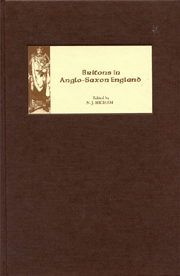Book contents
- Frontmatter
- Contents
- List of Illustrations
- List of Tables
- Contributors
- Dedication
- Acknowledgements
- Abbreviations
- 1 Britons in Anglo-Saxon England: An Introduction
- 2 Anglo-Saxon Attitudes
- 3 Forgetting the Britons in Victorian Anglo-Saxon Archaeology
- 4 Romano-British Metalworking and the Anglo-Saxons
- 5 Invisible Britons, Gallo-Romans and Russians: Perspectives on Culture Change
- 6 Historical Narrative as Cultural Politics: Rome, ‘British-ness’ and ‘English-ness’
- 7 British Wives and Slaves? Possible Romano-British Techniques in ‘Women's Work’
- 8 Early Mercia and the Britons
- 9 Britons in Early Wessex: The Evidence of the Law Code of Ine
- 10 Apartheid and Economics in Anglo-Saxon England
- 11 Welsh Territories and Welsh Identities in Late Anglo-Saxon England
- 12 Some Welshmen in Domesday Book and Beyond: Aspects of Anglo-Welsh Relations in the Eleventh Century
- 13 What Britons Spoke around 400 AD
- 14 Invisible Britons: The View from Linguistics
- 15 Why Don't the English Speak Welsh?
- 16 Place-Names and the Saxon Conquest of Devon and Cornwall
- 17 Mapping Early Medieval Language Change in South-West England
- Index
9 - Britons in Early Wessex: The Evidence of the Law Code of Ine
Published online by Cambridge University Press: 12 September 2012
- Frontmatter
- Contents
- List of Illustrations
- List of Tables
- Contributors
- Dedication
- Acknowledgements
- Abbreviations
- 1 Britons in Anglo-Saxon England: An Introduction
- 2 Anglo-Saxon Attitudes
- 3 Forgetting the Britons in Victorian Anglo-Saxon Archaeology
- 4 Romano-British Metalworking and the Anglo-Saxons
- 5 Invisible Britons, Gallo-Romans and Russians: Perspectives on Culture Change
- 6 Historical Narrative as Cultural Politics: Rome, ‘British-ness’ and ‘English-ness’
- 7 British Wives and Slaves? Possible Romano-British Techniques in ‘Women's Work’
- 8 Early Mercia and the Britons
- 9 Britons in Early Wessex: The Evidence of the Law Code of Ine
- 10 Apartheid and Economics in Anglo-Saxon England
- 11 Welsh Territories and Welsh Identities in Late Anglo-Saxon England
- 12 Some Welshmen in Domesday Book and Beyond: Aspects of Anglo-Welsh Relations in the Eleventh Century
- 13 What Britons Spoke around 400 AD
- 14 Invisible Britons: The View from Linguistics
- 15 Why Don't the English Speak Welsh?
- 16 Place-Names and the Saxon Conquest of Devon and Cornwall
- 17 Mapping Early Medieval Language Change in South-West England
- Index
Summary
ONE of the ‘facts’ about the modern study of Anglo-British relations is the extent to which the historian, generally speaking, is afforded a very circumscribed array of references with which to work, and the more so for the early Anglo-Saxon period. Certainly, a reasonable corpus of material survives which can be accessed to inform an understanding of how Anglo-Saxons and Britons may have interacted with one another, but the issue has to be approached by examining often peripheral and sometimes incidental references in a range of texts written for a variety of different purposes. And when attention is focussed specifically on the investigation of putative Britons living within Anglo-Saxon kingdoms, the selection from which to choose narrows quite substantially. It is in this context that the Law Code of Ine, king of Wessex c.688–726, deserves particular attention as it provides a rare glimpse of Britons living within an Anglo-Saxon kingdom around the turn of the eighth century. It also reveals a different view of relations between Britons and West Saxons to the unremittingly bellicose narrative enumerated in the Anglo-Saxon Chronicle. My aim in this paper is, therefore, to discuss Ine's Code and what it implies for relations between Britons and Saxons in early Wessex.
The Law Code of Ine was promulgated between c.688 and c.693. It is the earliest West Saxon law code to survive and has done so only as an appendix to the Laws of Alfred, both of which are contained at the earliest in a manuscript dated c. 930.
- Type
- Chapter
- Information
- Britons in Anglo-Saxon England , pp. 102 - 114Publisher: Boydell & BrewerPrint publication year: 2007



